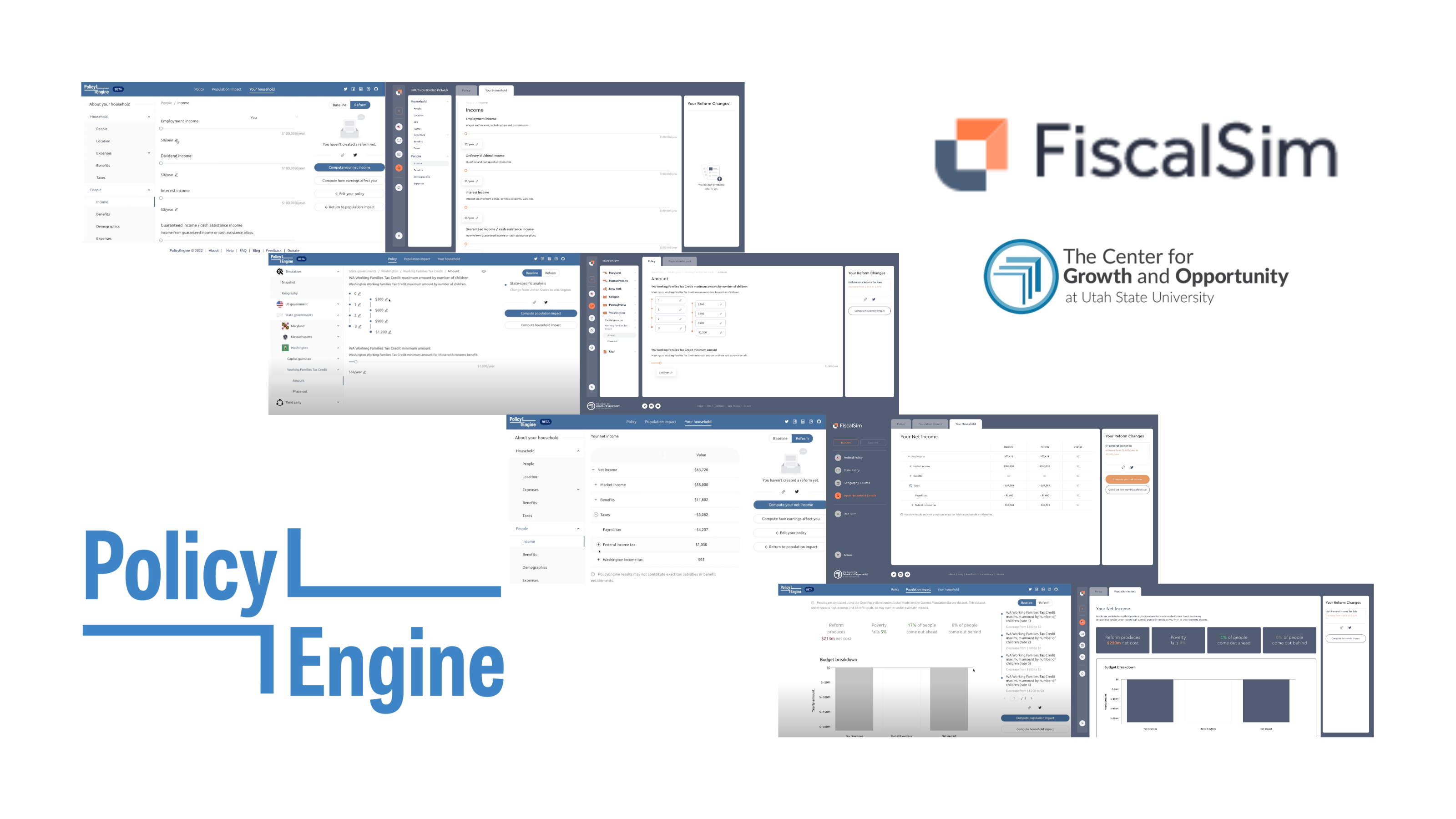FiscalSim and PolicyEngine: Emphasizing collaboration and open-source acknowledgment
The Center for Growth and Opportunity launches FiscalSim, a US policy-computing web app drawing heavily from PolicyEngine's work.

Contents
The launch of FiscalSim
FiscalSim US model
FiscalSim interface
Collaboration with the CGO
Acknowledging collaborative efforts
Moving forward
PolicyEngine, a nonprofit organization, has been dedicated to providing free, open-source software that computes the impact of public policy. Our mission has been to democratize the policy process by making it accessible for everyone, from experts to everyday citizens. To achieve this, we are committed to open-sourcing our models, apps, and reports, allowing anyone to freely use and scrutinize them.
Recently, we noticed the launch of
The launch of FiscalSim#
FiscalSim, a project of the CGO, allows users to simulate the effects of policy experiments on individuals and the economy. While we appreciate the CGO’s efforts to create a tool that promotes transparency and accessibility in the policy-making process, we feel it’s important to acknowledge the foundational work done by PolicyEngine and our past collaboration with the CGO.
FiscalSim US model#
Currently, the only differences between the FiscalSim US model and PolicyEngine US are the name and the inclusion of Utah’s state income tax policy. Of the policies listed in

Indeed, of all line changes in the FiscalSim US repo, 99% come from five
We have always made PolicyEngine’s code entirely open source.
FiscalSim interface#
The CGO based FiscalSim’s interface largely on PolicyEngine’s original design, which we used from
Consider these screenshots from our
The household screen resembles our original app, with sections of inputs on the left, inputs in the center, page navigation at the top (though they move some navigation to the far left), and reforms on the right. Because the content and organization of the variables follows from the model, those also match.

Similarly, FiscalSim’s parameter design mirrors ours.

The household net income screen breaks down income the same way (our video didn’t include a policy reform on this screen, but it had the same format and content as FiscalSim does).

The population impact screen also contains the same summaries and charts as our original version did.

Each of the four main sections of the FiscalSim app — household definition, policy reform, household impact, and population impact — draw heavily from our design, and the 99%-similar model code further highlights the resemblances.
Collaboration with the CGO#
About a year ago, the CGO funded PolicyEngine’s development of state income taxes in three states: Maryland, Massachusetts, and Washington. We sought to support their research through continued development, but they opted to build a separate app instead.
We have credited the CGO’s financial contribution on
Acknowledging collaborative efforts#
We understand that the development of software often involves collaboration and building upon existing frameworks. In the spirit of open-source development, we encourage the sharing and improvement of tools that contribute to better policy outcomes. However, we believe it’s essential to give credit where it’s due and acknowledge the collaborative efforts that have led to the creation of such tools. For instance, we credited the
Moving forward#
As we move forward, PolicyEngine remains committed to advancing open-source policy modeling tools and fostering collaboration within the community. We encourage the sharing and improvement of tools that contribute to better policy outcomes and believe it’s essential to give credit where it’s due.
We hope that future collaborations between PolicyEngine and other organizations, like the CGO, will result in mutual recognition and an open dialogue that benefits the policy-making community as a whole. As the landscape of policy modeling tools continues to evolve, it is crucial for organizations to work together to advance transparency, collaboration, and innovation. By working together, we can contribute to the ongoing development of accessible, transparent, and effective policy-making solutions.

max ghenis
PolicyEngine's Co-founder and CEO

nikhil woodruff
PolicyEngine's Co-founder and CTO

Subscribe to PolicyEngine
Get the latests posts delivered right to your inbox.
© 2025 PolicyEngine. All rights reserved.